In just a dozen years,
His Divine Grace
A.C. Bhaktivedanta Swami Prabhupada
gave the world a legacy that will last forever.
by Jayadvaita dasa
samsara-davanala-lidha-loka-
tranaya karunya-ghanaghanatvam
praptasya kalyana-gunarnavasya
vande guroh sri-caranaravindam
“The spiritual master is receiving benediction from the ocean of mercy. Just as a cloud pours water on a forest fire to extinguish it, so the spiritual master delivers the materially afflicted world by extinguishing the blazing fire of material existence. I offer my respectful obeisances unto the lotus feet of such a spiritual master.”
The Vedic teachers compare the material world in which we live to a forest fire. Although no one wants a forest fire, sometimes a fire spontaneously takes place in the forest, inflicting suffering on the helpless creatures who live there. But if, by the grace of God, storm clouds gather and shower their water, drenching the forest with rain, the forest and its creatures are saved. Similarly, when a bonafide spiritual master, by the grace of Krsna, showers upon human society the benediction of Krsna consciousness, that benediction can save us from the eternal problems of material ignorance and suffering and give us the chance to return to our real life of eternal bliss and knowledge in the service of Krsna. We should therefore glorify and offer our respectful homage unto the lotus feet of such a bona fide spiritual master.
A devotee poet has written that no one can fully understand the words, activities, and characteristics of a pure devotee. Nonetheless, let us try to appreciate some of the extraordinary gifts given to the world by the beloved spiritual master of the Hare Krsna movement, His Divine Grace A.C. Bhaktivedanta Swami Prabhupada.
Of course, although the movement Srila Prabhupada started has great tangible manifestations, his contribution is ultimately spiritual, not material, and therefore it will be appreciated according to one’s spiritual understanding. Just as an intellectual contribution is truly appreciated only by intellectuals, a spiritual contribution will best be appreciated by those who are advanced in spiritual culture and knowledge.
Generally speaking, gross material accomplishments win immediate popular applause, but they are also quickly forgotten. Although an intellectual contribution may take longer to be widely acclaimed, its benefits are more profound and long-lasting. A spiritual contribution, however, though perhaps least appreciated immediately, is ultimately the most profoundly significant and enduring. Therefore, let us try to understand and appreciate the myriad spiritual contributions of His Divine Grace A.C. Bhaktivedanta Swami Prabhupada, the Founder-Acarya of the International Society for Krishna Consciousness.
The first point we might consider is that whatever Srila Prabhupada did, he did not to serve any personal self-interest or create an individual charismatic mission, but rather to serve the will of the Supreme Lord, as expressed by the Lord Himself in the Vedic literature and handed down since time immemorial by the Vedic chain teachers. In the recent era, Srila Prabhupada’s spiritual master, Sri Srimad Bhaktisiddhanta Saraswati. Thakura, was the most outstanding representative of this Vedic line, and the spirit of full, unalloyed devotion to this great Vedic teacher and to the Supreme Lord Himself was the essence of all that Srila Prabhupada did.
Now, let us see the gifts Srila Prabhupada has given us, one by one
The Hare Krsna Mantra
Srila Prabhupada began his movement in the Western world simply by chanting the maha-mantra, or the Great Chant for Deliverance: Hare Krsna, Hare Krsna Krsna Krsna, Hare Hare Hare Rama Hare Rama, Rama Rama, Hare Hare. The Vedic scriptures repeatedly emphasize that no other method of spiritual realization can be as effective in the present age as the chanting of this maha mantra. It is the sublime method for reviving our transcendental consciousness. Krsna and Rama are names of the Supreme Lord, and Hare calls upon the spiritual energy of the Lord. By chanting these holy names, one can derive unlimited benefit, for this chanting can free one from all material entanglements and revive one’s dormant natural consciousness of unalloyed love of God . Sri Caitanya Mahaprabhu, the great apostle of love of God who appeared in India some five hundred years ago, desired that the benediction of these holy names of God be bestowed upon all living entities, and He predicted that one day the chanting of these holy names would be heard in every village and town of the world. It was Srila Prabhupada who established a worldwide movement—the Hare Krsna movement—to fulfill Sri Caitanya’s prediction and desire.
Wherever Srila Prabhupada went, on fourteen journeys around the globe, he constantly spread the chanting of the Hare Krsna mantra, and when he finally departed he was surrounded by loving disciples from around the world, loudly yet sweetly chanting these names of God he had given them. He began his movement by chanting Hare Krsna, and when he left, “Hare Krsna” were the last words he spoke. This was Srila Prabhupada’s mission: Let the chanting of Lord Krsna’s holy name be glorified!
Hare Krsna Hare Krsna
Krsna Krsna Hare Hare
Hare Rama Hare Rama
Rama Rama Hare Hare
No one can find the limits of the glories of these holy names, carried around the world by His Divine Grace Srila Prabhupada.
A Vedic Library Of Transcendental Knowledge
Although Srila Prabhupada gave us a way of transcendental realization by which even a child can very easily make advancement in spiritual life—simply by chanting Hare Krsna—he also left the world a unique library of profound philosophical literature, literature studied and praised by scholars and intellectuals, eagerly acquired by professors and librarians, and treasured by devotees of Vedic philosophy and culture.
Srila Prabhupada was the author of nearly seventy volumes of translations and summary studies of, and commentary upon, India’s immortal Vedic scriptures. His books have already been translated into twenty-eight different languages.
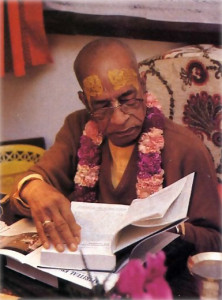
To a world afflicted by a lack of spiritual knowledge and plagued by sentimental, vague, flimsy ideas of wisdom and truth, Srila Prabhupada’s books offer the rigorously consistent, all-conquering, deeply rewarding transcendental philosophy of the Vedic literature. Srila Prabhupada’s books are unique because they present the Vedic literature as it is, without personally motivated interpretations. Consequently, his books, apart from their immense scholarly and literary value, offer one the opportunity to understand and actually attain the perfection of self-realization and ultimately realize the Absolute Truth, the Personality of Godhead, and see Him face to face. In other words, by reading his books, not only can one gain access to a wealth of Vedic history, poetry, philosophy, culture, and guidance in down-to-earth, practical affairs, but also one can traverse the path to the highest perfection of human life. Those who have lost their spiritual vision due to the darkness of the present age of quarrel can get light from the books of His Divine Grace Srila Prabhupada.
Distribution of Vedic Knowledge
Srila Prabhupada was never satisfied merely to write books, nor to print them and keep the copies in stock. Rather, earnestly desired that books of Vedic wisdom be profusely distributed for the enlightenment of human society. Thus in 1972 His Divine Grace established the Bhaktivedanta Book Trust, which in six years has become the world’s largest publisher and distributor of books concerning the philosophy, religion, and culture of India. It was his desire that BBT books be placed everywhere, every library and home.
Indeed, nearly every college and university library in the United States has at least one of Srila Prabhupada’s books, and more than twenty-five hundred college professors and public and university libraries have placed orders for full sets. Inspired by Srila Prabhupada, his disciples have distributed more than sixty million books of Vedic knowledge. Thus, by Srila Prabhupada’s desire, the true glory of Vedic knowledge and culture is now being recognized, for the first time, throughout the world.
Here we may also mention that Srila Prabhupada was the founder and original editor of BACK TO GODHEAD, which he began in India in 1944 and which continues to be published according to his eternal directions.
The Society of Devotees
Some of Srila Prabhupada’s earliest disciples recall that in 1966, when Srila Prabhupada, newly arrived in New York City, first began holding classes in an old loft in the Bowery, he had a small, handwritten sign downstairs near the mailbox: “International Society for Krishna Consciousness.” In those days, the Society was not very extensive. Practically speaking, there was only Srila Prabhupada himself. But where others may have seen only an elderly Indian svami and a few young men coming to hear him, Srila Prabhupada, with his usual transcendental vision, saw the hope for an international society of devotees that could spread all over the world.
A devotee poet has sung, tandera carana sevi bhakta-sane vasa: “Let me serve at the feet of the gosvamis—the predecessor spiritual masters—and let me always associate with devotees.” This is the essence of Krsna consciousness. Alone, one may find it very difficult to make spiritual advancement, but in the company of devotees, all sharing the same objective, advancement becomes swift and easy. Moreover, a society of devotees, all cooperating for the service of Krsna, can act wonderfully to spread Krsna consciousness for the benefit of others. A pure devotee knows that Krsna is the supreme enjoyer, Krsna is the supreme proprietor of everything, and Krsna is the supreme friend of every living being. Therefore, although a pure devotee is himself completely God-realized, for the benefit of others he desires: “Let there be a society of devotees. Let the people of the world serve Krsna together and be happy.” This was Srila Prabhupada’s desire. He confidently began his tiny society, carefully nurtured and expanded it, and trained his disciples to expand it further and maintain its purity. Thus by Srila Prabhupada’s grace, we now have a strong, healthy spiritual society of devotees, devotees from all walks of and all nations of the world—a United Nations, in which everyone unite on the spiritual platform, in service of Krsna.
Once, years ago, an astrologer took count of Srila Prabhupada’s horoscope and remarked, “This person can build a house big enough for the whole world to live in.” We are grateful to be able to live in that house—the society of devotees that Srila Prabhupada began—and share the warmth and joy of Krsna consciousness with others under its roof.
Purity Is the Force
In particular, we may note that Srila Prabhupada never compromised principles. The standard Vedic discipline requires that one strictly follow the basic rules—no gambling, no intoxication, no meat-eating, and no illicit sex. When Srila Prabhupada first arrived America and saw for himself the high fever of Western materialistic life, thought, “Who will agree to follow these rules? As soon as I mention them, everyone will go away.” Nonetheless never seeking to become popular catering to the public taste, he always insisted that his disciples adhere to these basic rules for spiritual purity. His mission was to present the right medicine for the materialistic disease, even though that medicine might at first seem a little bitter, for he knew that what might seem bitter at first would very soon taste sweet. Only when an aspiring devotee was regularly chanting Hare Krsna and following these basic Vedic principles would Srila Prabhupada accept him as an initiated disciple.
Temples Around the World
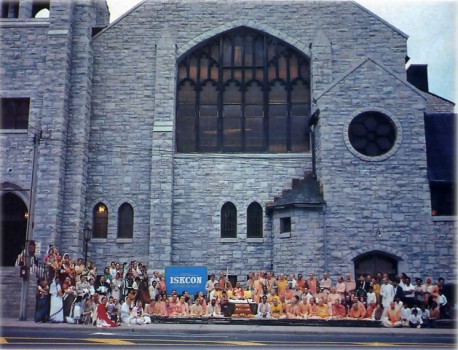
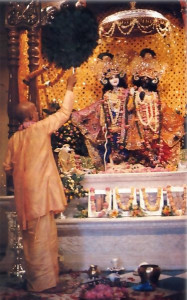
In the context of his International Society, Srila Prabhupada, in the brief span of ten years, established more than one hundred temples of Krsna consciousness in thirty-six countries-in North America, South America, Europe, Australia, Africa, and Asia. Some of them he started personally, and others through his disciples. That was another aspect of Srila Prabhupada’s genius: he was expert not only in serving Lord Sri Krsna, but also in training others to assist him in Lord Krsna’s service. He personally demonstrated how to conduct all the temple affairs—how to clean the temple (he showed us on his hands and knees); how to hold classes and festivals; how to cook food for Krsna, offer it to Him, and then serve it to devotees and guests; how to grow flowers for Krsna; and even how to keep accounts and acquire temple property. He did everything perfectly, and with unceasing devotion he traveled around the world, perfectly teaching his disciples how to follow in his footsteps and spread Krsna’s mission for the benefit of others.
Service to the Deity
In each of his temples, Srila Prabhupada established the murti, or Deity, of Lord Krsna. To a materialist, the Deity appears to be no more than a statue of wood or stone, but an advanced transcendentalist, seeing through the eye of Vedic knowledge, understands that the Deity is nondifferent from Krsna Himself and that without worshiping the Deity one cannot fully develop and mature one’s love for God. Because the form of the Deity is exactly described in the Vedic scriptures, it is the answer to all imaginative iconography about the form of God. By appearing as the Deity, Krsna frees the conditioned soul from false ideas that God is impersonal or void, and by worshiping the Deity, one learns how to love Krsna and becomes eligible to go back home, back to Godhead. When Srila Prabhupada came before the Deity, he saw not a statue but Lord Krsna Himself, and with tears of love in his eyes he bowed down before Lord Krsna in devotion, considering himself but a humble servant of the Deity. The extent of the struggle Srila Prabhupada personally, willingly undertook in London and Bombay for the service of the Deity is only partially known, even to his disciples. Srila Prabhupada’s glories are fully known only to Lord Krsna Himself. As Krsna becomes increasingly celebrated and the science of Krsna more fully understood, so too will the glories of His dearly beloved servant, His Divine Grace A.C. Bhaktivedanta Swami Prabhupada.
Spiritual Food
Krsna consciousness, Srila Prabhupada would often say, is not dry. Devotees of Krsna are not dry renouncers. To prove it, Srila Prabhupada introduced the transcendental art and pleasure of cooking and eating in Krsna consciousness. He personally showed his disciples how to cook many varieties of palatable vegetarian dishes, offer them to the Supreme Lord, Krsna, for His satisfaction, and then accept the food thus sanctified as krsna-prasada—the mercy of Lord Krsna. This was another of Srila Prabhupada’s transcendental desires: Let the whole world taste krsna-prasada!
By eating krsna-prasada, not only can one fulfill the demands of the tongue in a very nice way, but also, as understood from Bhagavad-gita, one becomes free from the reactions of all past sinful deeds and makes advancement in spiritual life. Thus purified, one is released from dualities and illusions, and one becomes eligible to render devotional service to the Supreme Lord. Srila Prabhupada, therefore, was always pleased to see that his disciples were eating only krsna-prasada. On many occasions, he personally cooked prasada and then served the devotees with his own hand. This was Srila Prabhupada’s program: chanting, dancing, philosophy, and feasting. Anyone may come to any of Srila Prabhupada’s temples and take sumptuous krsna-prasada, and especially on Sundays each temple invites guests to enjoy opulent prasada feasts. Directed by Srila Prabhupada, many temples have started prasada restaurants and even mobile kitchens to distribute the mercy of Krsna. And in India, where hunger is for many people a very real day-to-day problem, Srila Prabhupada started ISKCON Food Relief—a program to distribute prasada in massive quantities to the needy.
Even in his final days on earth, Srila Prabhupada asked to hear in detail about how prasada was being distributed in his temples, and although he himself was eating nothing at all and drinking only a few ounces of fruit juice, he took particular care to see that the devotees and guests who visited him in Vrndavan were all fed sumptuous krsna-prasada..
Festivals of Transcendental Life
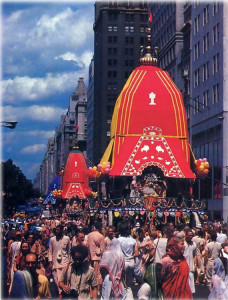
Every year since time immemorial, millions of people have journeyed to India’s holy city Jagannatha Puri to take part in a joyous transcendental festival-Ratha-yatra, the Festival of the Chariots—to glorify the Lord of the universe. When Srila Prabhupada was small child in Calcutta, he insisted to his father that he too wanted to celebrate Ratha-yatra festival. Thus his father built him a small cart, and Srila Prabhupada led his neighborhood friends in chanting Hare Krsna and celebrating the festival as their childhood play. Later in life, when Srila Prabhupada became the spiritual master of the Hare Krsna movement, he led his disciples in celebrating the same transcendental festival, on a large scale, in major cities throughout the world—San Francisco, New York, London, and many others. Thus he showed how to give millions of people the opportunity to chant Hare Krsna, dance in ecstasy, take krsna-prasada, and begin the journey back home, back to Godhead.
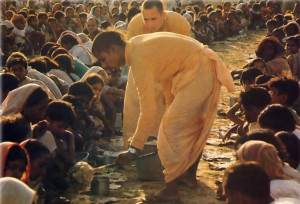
Every Town and Village
In addition to establishing temples for festivals in major cities of the world, Srila Prabhupada also inspired and organized his disciples to travel from city to city, town to town, to preach the message of Krsna everywhere. From American suburbs to African tribal villages, Sri Prabhupada’s disciples, following in the-footsteps of their spiritual master, chant Hare Krsna and distribute literature about Krsna consciousness for the benefit of others. Feeling compassion for those unfortunate souls who had forgotten Krsna, Srila Prabhupada was always immersed in the mood of the great, devotee Prahlada Maharaja, who once prayed to the Lord: “O best of great personalities, I am not at all afraid of material existence, for wherever I stay am fully absorbed in thoughts of Your glories and activities. My concern is only for the fools and rascals who are making elaborate plans for material happiness and maintaining their families, societies and countries. I am simply concerned with love for them.”
Science and Art for Purified Senses
We should not think that Srila Prabhupada was the leader of a sectarian religion. On the contrary, the principles taught by Srila Prabhupada were universal, far transcending the superficial, man-made boundaries between one religious sect and another, and even transcending religion itself. “Gold is natural,” Srila Prabhupada taught. “We do not speak of ‘Hindu gold’ or ‘Christian gold.’ Gold is always gold. Similarly, when we speak of Krsna consciousness, we refer to the natural pure consciousness lying dormant within the heart of every living being.” Srila Prabhupada didn’t care about the temporary “isms” of this material world. Rather, he sought to awaken that dormant spiritual consciousness—unalloyed love of God. Let our senses be cleansed of all material, bodily designations, and let the purified senses be engaged in the service of the Supreme Lord. This was Srila Prabhupada’s desire.
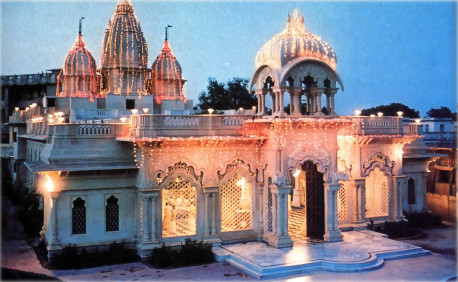
Thus, far from being a sectarian religious figure, Srila Prabhupada was the leader of a cultural movement for the respiritualization of all human society. Literature, music, dance, drama, painting, sculpture, film—all can serve to purify our senses and awaken and express our eternal love for Krsna. Srila Prabhupada was the spiritual master who taught how this can be done.
And why only the arts? The sciences also, Srila Prabhupada taught, should be directed towards the Absolute Truth. Srila Prabhupada boldly challenged scientific theories that make matter alone the basis of everything and fail to acknowledge a spiritual energy and supreme controller. Such theories, he said, were the notions of rascals and fools. Indeed, he so logically and convincingly presented the science of spiritual realization that even scientists stepped forward to become his disciples. Later, these disciples formed an educational society of Ph.D.’s—the Bhaktivedanta Institute—to introduce this Vedic understanding to their colleagues.
Ideal Life in Harmony With God and Nature
 The spiritual master, as the representative of the Lord, conveys the Lord’s instructions and shows how to put them into practical effect. In the Vedic scriptures, the Supreme Lord perfectly teaches how to live happily in this world and at the end of life go back home, back to Godhead. He gives the perfect system of social organization, known as varnasrama-dharma, and He tells us how to solve all economic problems simply—by depending on the natural fertility of the earth and by protecting cows and drinking the milk He’s arranged for them to give us. Thus Srila Prabhupada, to demonstrate the practical value of “simple living and high thinking” according to the Vedic way, established twelve Krsna conscious farm communities in North America, South America, Europe, Australia, and India. There, devotees work hard in a simple, natural life, dedicating their thoughts, their words, and their work to the devotional service of Krsna. As life in the world’s cities becomes increasingly hellish, as it surely will, those who wish to turn away from their artificial mode of life and return to the way prescribed by the Lord Himself will be increasingly grateful to His Divine Grace Srila Prabhupada for giving them the chance to do so, not only in theory but as a working day-by-day reality.
The spiritual master, as the representative of the Lord, conveys the Lord’s instructions and shows how to put them into practical effect. In the Vedic scriptures, the Supreme Lord perfectly teaches how to live happily in this world and at the end of life go back home, back to Godhead. He gives the perfect system of social organization, known as varnasrama-dharma, and He tells us how to solve all economic problems simply—by depending on the natural fertility of the earth and by protecting cows and drinking the milk He’s arranged for them to give us. Thus Srila Prabhupada, to demonstrate the practical value of “simple living and high thinking” according to the Vedic way, established twelve Krsna conscious farm communities in North America, South America, Europe, Australia, and India. There, devotees work hard in a simple, natural life, dedicating their thoughts, their words, and their work to the devotional service of Krsna. As life in the world’s cities becomes increasingly hellish, as it surely will, those who wish to turn away from their artificial mode of life and return to the way prescribed by the Lord Himself will be increasingly grateful to His Divine Grace Srila Prabhupada for giving them the chance to do so, not only in theory but as a working day-by-day reality.
The Mercy of Krsna in India
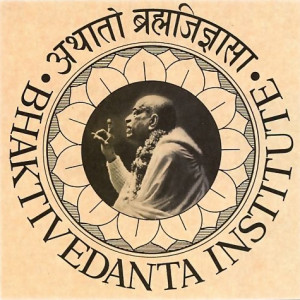
The Vedic literature repeatedly emphasizes the spiritual importance of India. Since time immemorial, India has been a center of spiritual knowledge and culture. From the Vedic scriptures we understand that in former ages the world was one unified kingdom, with its capital in India, and the Srimad-Bhagavatam tells us that even if spiritual culture declines, as it has in the present age, in India it may at any time be very quickly revived. Srila Prabhupada, therefore, especially in his last years, devoted great energy toward revitalizing India’s declining spiritual culture. He personally traveled in India extensively, from city to city, always preaching, and started several branches of his International Society. In Hyderabad he began a large farm project, and in Bombay he under took the ambitious construction of a modern Center for Vedic Education and Culture, including a magnificent temple, a 450-seat theater, a recording studio, an extensive Vedic library, a prasada restaurant, and a comfortable eight-story guesthouse.
Throughout India there are also many sacred places especially favorable for spiritual advancement, but among them all, the holy cities Vrndavana and Mayapur are especially important. In these places, therefore, Srila Prabhupada established special centers so that visitors from around the world may go there to cultivate Krsna consciousness. In Vrndavana, where Lord Sri Krsna performed His youthful pastimes five thousand years ago, Srila Prabhupada established the Krsna-Balarama Temple and International Guesthouse, now a place of pilgrimage for visitors both from India and from abroad. And in Sridhama Mayapur, the birthplace of Sri Caitanya Mahaprabhu, the already completed guesthouse, temple, and residence buildings mark the initial stages of what Srila Prabhupada planned to be a full-scale Krsna conscious city. When completed, Srila Prabhupada’s “Vedic Planetarium and Temple of Understanding,” in the center of the city, will be the largest temple and cultural center in India. Moreover, the city will set an ideal example—for India and for the world—of how society should be organized for a life of Vedic culture and spiritual advancement, culminating in Krsna consciousness. This was but another of the many ways by which Srila Prabhupada desired to bestow the benediction of Krsna consciousness—the perfection of life—upon the people of India, and of the entire world.
Schools for Self-realization
Looking forward toward the welfare future generations, Srila Prabhupada also reestablished the age-old gurukula system of education, by which a child learns early in life how to control his senses, fix his mind upon Krsna, and make his whole life successful in spiritual values. The human form of life, Srila Prabhupada taught, is a rare gift and although it is short, it offers one the greatest opportunity—the chance to go back home, back to Godhead. Srila Prabhupada therefore established gurkula schools around the world, and especially in Vrndavana, to enable children to take full advantage of the great opportunity. Srila Prabhupada had great affection for his gurukula children as they had great affection for him. Much earlier in his life, Srila Prabhupada was a Krsna conscious child, and later he most kindly attended to the Krsna conscious children of the present—and the future
Conclusion
In many wonderful and varied way; Srila Prabhupada worked to bestow upon the world the benediction of Krsna consciousness. Yet perhaps his greatest contribution was the personal change he brought about in the hearts of his disciples. The joy and purity of Srila Prabhupada’s disciples, their dedication and their freedom from sinful life—these are outward signs. But the inner gratitude each disciple feels to his spiritual master for having changed the course of his life is practically inexpressible. We can best echo the words of the great devotee Prahlada, who prayed to the Lord: “My dear Lord, O Supreme Personality of Godhead, because of my association with material desires, one after another, I was gradually falling into blind well full of snakes, following the general populace. But Your servant, my spiritual master, kindly accepted me as his disciple and instructed me how to achieve the transcendental position . Therefore, my first duty is to serve him. How could I leave his service?”
Srila Prabhupada factually rescued his disciples from the materialistic life of today’s misdirected world and led then on the path back home, back to Krsna, the Supreme Personality of Godhead. Now, Srila Prabhupada himself has left this world and gone back to the spiritual world of Krsna. Yet although physically His Divine Grace is no longer with us he lives eternally by his instructions, by the movement he began, and by the memory of his personal example of how to serve Krsna in unalloyed love and devotion.

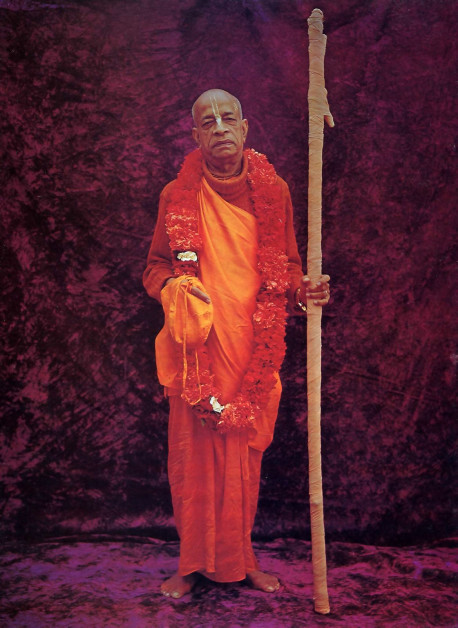
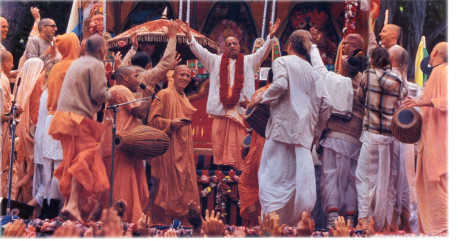

Leave a Reply